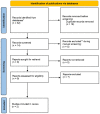Translational Research in Audiology: Presence in the Literature
- PMID: 36546905
- PMCID: PMC9774235
- DOI: 10.3390/audiolres12060064
Translational Research in Audiology: Presence in the Literature
Abstract
Translational research is a process that focuses on advancing basic research-based clinical solutions and is characterized by a structured process accelerating the implementation of scientific discoveries in healthcare. Translational research originated in oncology but has spread to other disciplines in recent decades. A translational project may refer to pharmacological research, the development of non-pharmacological therapies, or to disease monitoring processes. Its stages are divided into basic research focused on the clinical problem (T0), testing the developed means in humans (T1), conducting trials with patients (T2), implementation and dissemination of successful approaches (T3), and improving community health (T4). Many audiological studies are translational in nature. Accordingly, this scoping review aimed to evaluate the use of the terms "translational audiology" and "translational research in audiology" in the literature and examine the goals of the identified studies. PubMed and Web of Science search identified only two publications meeting the search criteria. We conclude that identifying translational audiological studies in the literature may be hampered by the lack of use of the terms "translational audiology" or "translational research". We suggest using these terms when describing translational work in audiology, with a view to facilitating the identification of this type of research and credit it appropriately.
Keywords: audiology; translational audiology; translational research; translational science.
Conflict of interest statement
The authors declare no conflict of interest.
Figures


Similar articles
-
Implementation Science: Increasing the Public Health Impact of Audiology Research.Am J Audiol. 2022 Sep 21;31(3S):849-863. doi: 10.1044/2022_AJA-21-00205. Epub 2022 Jun 7. Am J Audiol. 2022. PMID: 35671467 Free PMC article. Review.
-
A Systematic Review of Audiology Terminology.J Audiol Otol. 2016 Sep;20(2):109-13. doi: 10.7874/jao.2016.20.2.109. Epub 2016 Sep 1. J Audiol Otol. 2016. PMID: 27626085 Free PMC article.
-
Beyond the black stump: rapid reviews of health research issues affecting regional, rural and remote Australia.Med J Aust. 2020 Dec;213 Suppl 11:S3-S32.e1. doi: 10.5694/mja2.50881. Med J Aust. 2020. PMID: 33314144
-
Mapping the evolving definitions of translational research.J Clin Transl Sci. 2017 Feb;1(1):60-66. doi: 10.1017/cts.2016.10. Epub 2017 Feb 2. J Clin Transl Sci. 2017. PMID: 28480056 Free PMC article. Review.
-
Improving Translational Paradigms in Drug Discovery and Development.Curr Protoc. 2021 Nov;1(11):e273. doi: 10.1002/cpz1.273. Curr Protoc. 2021. PMID: 34780124
Cited by
-
Universal Recommendations on Planning and Performing the Auditory Brainstem Responses (ABR) with a Focus on Mice and Rats.Audiol Res. 2023 Jun 2;13(3):441-458. doi: 10.3390/audiolres13030039. Audiol Res. 2023. PMID: 37366685 Free PMC article.
-
Translational Research in Audiology.Audiol Res. 2023 Sep 25;13(5):721-723. doi: 10.3390/audiolres13050063. Audiol Res. 2023. PMID: 37887844 Free PMC article.
References
-
- Le Prell C.G., Lobarinas E., Popper A.N., Fay R.R. Translational Research in Audiology, Neurotology, and the Hearing Sciences. Volume 58 Springer; Berlin/Heidelberg, Germany: 2016.
Publication types
LinkOut - more resources
Full Text Sources

